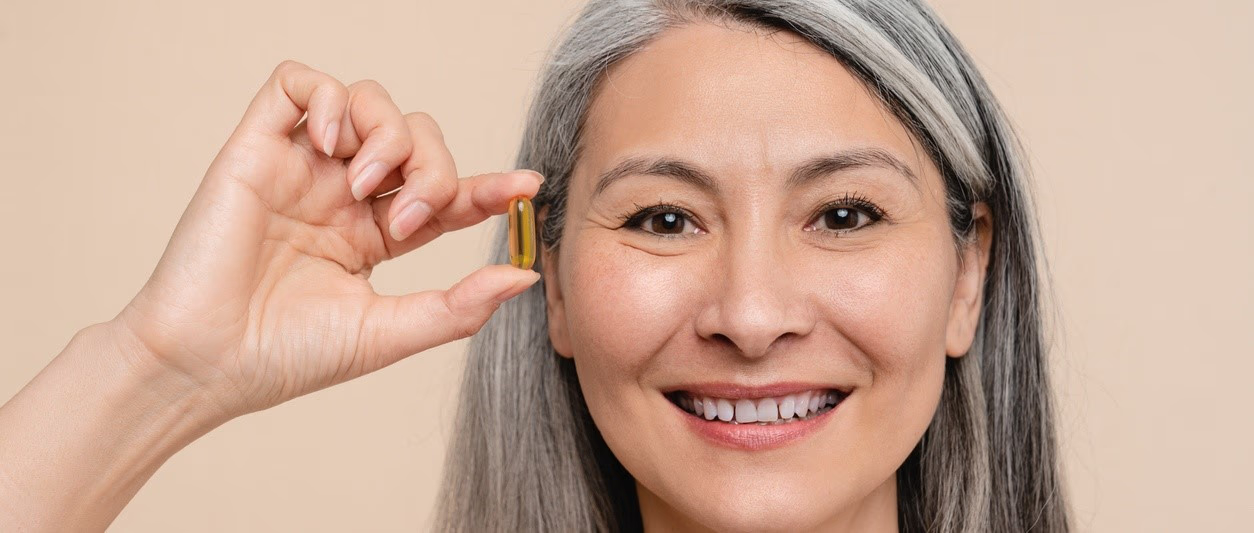
The best anti-ageing supplements for your health
Peer reviewed by Dr Krishna Vakharia, MRCGPLast updated by Amberley DavisLast updated 14 Feb 2024
The term anti-ageing is written on many beauty creams and other skincare products packaging. But what does anti-ageing mean inside the body? Here, it goes beyond the appearance of our face lines, to healthy internal ageing. This means how well our cells and organs are remaining healthy and able to fight decline and disease as we grow older - so that we can live happily for as long as possible.
We explore the anti-ageing supplements that help our bodies do just this, according to experts.
In this article:
Continue reading below
What are anti-ageing supplements?
Anti-ageing supplements are really about healthy ageing, so that we can live long and happy lives. They won't stop us ageing, but they may slow down decline and lower our risk of age-related disease and problems.
Dietitian nutritionist Eva De Angelis says: "While anti-ageing supplements are not necessary for everyone, there is no denying that as we age our ability to absorb all the nutrients we need declines, and we may have an increased risk of malnutrition. This is especially true if we don't pay close attention to our eating habits once we reach 50."
For instance, she explains that as we get older:
We are more prone to lose muscle mass.
Our metabolism slows down slightly after age 60.
We lose bone density - especially in women after menopause.
Our brain health may decline.
These are some of the changes that can shorten our lifespans and cause health conditions. But there are many important vitamins and other nutrients that can help slow this down, and supplements can help us absorb many of those that we need.
What about food sources of nutrients?
Anti-ageing supplements are not a replacement for natural nutrient sources found in foods, which the body tends to absorb more easily and efficiently. However, they can complement a healthy diet to ensure you're getting all that you need, and in some cases taking supplements is recommended. For example:
When we are older and eat less food - as we get older, our energy needs fall and eating less is expected. However, this can mean we're not getting all the nutrients from food we need1.
When it's challenging to get a nutrient from food alone - for example, we get most of our vitamin D from sunlight, but during winter there isn't enough and it's hard to meet our requirements through food alone. In the UK, the government recommends everyone take a daily vitamin D supplement between October and April.
Having a condition that disrupts nutrient intake - for example, IBS and intestinal malabsorption can mean you miss out on important food sources.
De Angelis recommends vitamin D supplements for healthy ageing and longevity. This vitamin is crucial for bone health, especially in older adults where a lack of vitamin D means calcium can't be as well absorbed and the risk of osteoporosis is high2,3.
"Vitamin D also supports your immune system, muscles, and neural connections in your brain, and it may help reduce the risk of depression, heart disease, type 2 diabetes, and obesity," says the dietitian.
"If you are concerned, you can ask your doctor if it is possible to have a blood test to see if your vitamin D levels are low. If you are low in vitamin D you may only need to take supplements for 1 or 2 months to restore healthy levels.
"You can get either animal-origin vitamin D supplements (D3) or vegan-friendly vitamin D supplements (D2)."
Foods with vitamin D: You should also try to eat fatty fish, fish liver oil, egg yolks, beef liver, mushrooms, butter, cheeses, and foods fortified with vitamin D, like some cereals and plant-based milks.
Melatonin supplements
You may have heard of melatonin as the hormone that helps you fall asleep, but its supplement can be used for more than sleep problems. In fact, melatonin supplements have been studied for their effects on a healthy lifespan.
It's thought that the antioxidants in melatonin could possibly fight ageing by helping to ward off cardiovascular diseases like high blood pressure and stroke, and neurodegenerative diseases like Alzheimer's and Parkinson's4- however research in this area is ongoing.
Foods with melatonin: In your diet focus on eggs, goji berries, cow's milk, fatty fish, pistachios, almonds and tart cherries.
Note that melatonin supplements are only available over-the-counter in the US. In the UK, they are prescription-only, and currently used to treat adults over 54 years old experiencing sleep problems.
Continue reading below
Vitamin B12 supplements
It's common for people following plant-based diets to take vitamin B12 supplements because this vitamin is mostly found in animal foods.
De Angelis says that vitamin B12 is essential for proper nervous system function, DNA synthesis, and the production of red blood cells. Not getting enough has been linked to2:
Brain power decline.
An increased risk of dementia and Alzheimer's disease.
Depression.
An increased risk of cardiovascular disease.
Foods with vitamin B12: Best sources include beef, sardines, animal kidneys and liver, clams, tuna, salmon, trout and eggs. The best options for a plant-based diet include fortified foods like cereals and plant-based milks.
Check with a healthcare professional before taking any B12 supplements.
Patient picks for Ageing
EGCG supplements
Epigallocatechin gallate, known as EGCG, is a powerful antioxidant derived from green tea. Some dietitians recommend EGCG supplements for longevity, because the compound protects cells and muscle mass.
While more studies of EGCG supplementation in humans are needed5, research on green tea consumption has shown that EGCG may promote a healthy lifespan in several ways. For example, it may help protect against major diseases like cancer, cardiovascular disease, and neurodegenerative illness6.
In a healthy gut, EGCG is converted to its active ingredient urolithin A. But in an unhealthy gut, it is converted to an unhelpful, possibly toxic metabolite instead.
This is why it's important to choose an EGCG supplement from a respected company with clean, third-party tested products.
Foods with EGCG: Focus on green tea, and smaller amounts also found in black, white and oolong teas, fruits like strawberries, cherries, kiwis, apples and avocados, and nuts like hazelnuts and pistachios.
Continue reading below
Omega-3 supplements
Omega-3 fats are crucial for brain and heart health at any age. De Angelis says: "They help lower blood pressure, blood cholesterol, and blood fat levels. This helps prevents plaque formation and reduces the body's inflammatory response, protecting against a range of lifespan-shortening conditions like atherosclerosis, diabetes and heart disease."
Many of us may be getting enough omega-3 fatty acids from foods, but if you don't normally eat the foods below, Dr Angelis believes you could benefit from taking omega-3 supplements.
Foods with omega-3: Choose fatty fish - such as salmon, tuna, mackerel, and sardines - flax seeds, flax meal, flax oil, soybean oil, canola oil, walnuts, and chia seeds.
Taking more than 3,000 mg of omega-3 daily may be harmful. When choosing supplements, be sure to read the label and select one with at least 50% (EPA+DHA).
What about multivitamins?
Buying a multivitamin supplement can feel like a money and time saving option, but the truth is that not all nutrients can be absorbed well in supplement form, and it's best to treat marketing claims with caution.
"I do not recommend multivitamins as they may have higher dosages of particular nutrients and not so much of others," says De Angelis. This means that you may not be getting the right levels of what you need, whereas taking an individual supplement agreed upon with your doctor can better supply you with what you need.
Always check with a healthcare provider before taking any over-the-counter supplements, and don't exceed the recommended daily limit outlined on the label.
Further reading
Article History
The information on this page is written and peer reviewed by qualified clinicians.
14 Feb 2024 | Latest version
14 Feb 2024 | Originally published
Authored by:
Amberley Davis

Feeling unwell?
Assess your symptoms online for free

